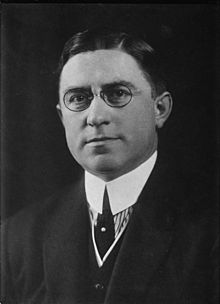Louis T. McFadden: Difference between revisions
m removed white space |
→External links: deleted broken link to fringe source |
||
| Line 49: | Line 49: | ||
* Flaherty, Edward, Ph.D. [http://www.publiceye.org/conspire/flaherty/flaherty10.html ''The Legendary Tirade of Louis T. McFadden''] — Article criticizing McFadden's speech against the Federal Reserve. |
* Flaherty, Edward, Ph.D. [http://www.publiceye.org/conspire/flaherty/flaherty10.html ''The Legendary Tirade of Louis T. McFadden''] — Article criticizing McFadden's speech against the Federal Reserve. |
||
* [http://politicalgraveyard.com/bio/mcduffee-mcfarlan.html The Political Graveyard] |
* [http://politicalgraveyard.com/bio/mcduffee-mcfarlan.html The Political Graveyard] |
||
* [http://www.modernhistoryproject.org/mhp/ArticleDisplay.php?Article=McFadden1932&Entity=FedResBoard "Louis T. McFadden on the Federal Reserve."] Modern History Project. Retrieved 25 Nov 2006. — Text of McFadden's [[June 10]][[1932]] speech condemning the Federal Reserve. |
|||
{{start box}} |
{{start box}} |
||
Revision as of 16:10, 3 October 2009
Louis Thomas McFadden | |
|---|---|
 | |
| Member of the U.S. House of Representatives from Pennsylvania's 14th district | |
| In office 1915–1923 | |
| Preceded by | William D.B. Ainey |
| Succeeded by | William M. Croll |
| Member of the U.S. House of Representatives from Pennsylvania's 15th district | |
| In office 1923–1935 | |
| Preceded by | Edgar R. Kiess |
| Succeeded by | Charles E. Dietrich |
| Personal details | |
| Born | thumb July 25, 1876 Granville Center, Troy Township, Bradford County, Pennsylvania |
| Died | October 1, 1936 (aged 60) New York City |
| Resting place | thumb Louis T. McFadden |
| Political party | Republican |
| Parent |
|
Louis Thomas McFadden (July 25, 1876 – October 1, 1936) was a Republican member of the U.S. House of Representatives from Pennsylvania.
Early life
McFadden was born in Granville Center, Troy Township, Bradford County, Pennsylvania. He graduated from Warner's Commercial College in Elmira, New York. In 1892 he entered the employ of the First National Bank in Canton, Pennsylvania. In 1899 he was elected cashier, and became its president on January 11 1916, serving until 1925.[citation needed]
He served as treasurer of the Pennsylvania Bankers’ Association in 1906 and 1907, and as president in 1914 and 1915. He was appointed in 1914 by the agricultural societies of the State of Pennsylvania as a trustee of Pennsylvania State College.[citation needed]
Political career
In 1914, McFadden was elected as a Republican Representative to the Sixty-fourth Congress and to the nine succeeding Congresses. He served as Chairman of the United States House Committee on Banking and Currency during the Sixty-sixth through Seventy-first Congresses, or 1920-31. Though re-elected without opposition in 1932, in 1934 he lost to the Democratic nominee by 561 votes. He was an unsuccessful candidate for nomination in 1936.[citation needed]
McFadden's main official legacy was the working on and the passing of the McFadden Act of 1927 limiting federal branch banks to the city in which the main branch operates.[citation needed] The Act sought to give national banks competitive equality with state-chartered banks by letting national banks branch to the extent permitted by state law. The McFadden Act specifically prohibited interstate branching by allowing national banks to branch only within the state in which it is situated. Although the Riegel-Neal Interstate Banking and Branching Efficiency Act of 1994 repealed this provision of the McFadden Act, it specified that state law continues to control intrastate branching, or branching within a state's borders, for both state and national banks.
McFadden is also remembered for his criticism of the Federal Reserve, which he claimed was created and operated by European banking interests who conspired to economically control the United States. On June 10, 1932, McFadden made a 25-minute speech before the House of Representatives, in which he accused the Federal Reserve of deliberately causing the Great Depression. McFadden also claimed that Wall Street bankers funded the Bolshevik Revolution through the Federal Reserve banks and the European central banks with which it cooperated. In the same speech McFadden expressed dismay at the fact that over $13 million in gold had been shipped to a rebuilding Germany that year by the Federal Reserve. He also explained how Nelson Aldrich was tutored by European bankers, then later submitted the Aldrich bill, a translation of the statutes of the Reichsbank and other European central banks, which became the Federal Reserve Act after a half-million-dollar public information program. [1]
McFadden moved to impeach President Herbert Hoover in 1932, and also introduced a resolution bringing conspiracy charges against the Board of Governors of the Federal Reserve. The impeachment resolution was defeated by a vote of 361 to 8; it was seen as a big vote of confidence to President Hoover from the House.[2]
In 1933, he introduced House Resolution No. 158, articles of impeachment for the Secretary of the Treasury, two assistant Secretaries of the Treasury, the Board of Governors of the Federal Reserve, and the officers and directors of its twelve regional banks.[citation needed]
There were two attempts on McFadden's life, a failed shooting and an apparent poisoning that made him "violently ill" after attending a political banquet in Washington. [3][4] He died in 1936 on a visit to New York City and was interred in East Canton Cemetery in Canton, Pennsylvania.
References
- ^ http://www.scribd.com/doc/16502353/Congressional-Record-June-10-1932-Louis-T-McFadden
- ^ ""I Impeach. . . ."". TIME. December 26, 1932. Retrieved 2007-09-15.
- ^ Robert Edward Edmondson, Pelley's Weekly, October 14, 1936
- ^ "Congressman Louis T. McFadden on the Federal Reserve Corporation: Remarks in Congress, 1934", The Forum Publishing Company of Boston, Massachusetts
External links
- United States Congress. "Louis T. McFadden (id: M000434)". Biographical Directory of the United States Congress.
- Flaherty, Edward, Ph.D. The Legendary Tirade of Louis T. McFadden — Article criticizing McFadden's speech against the Federal Reserve.
- The Political Graveyard
